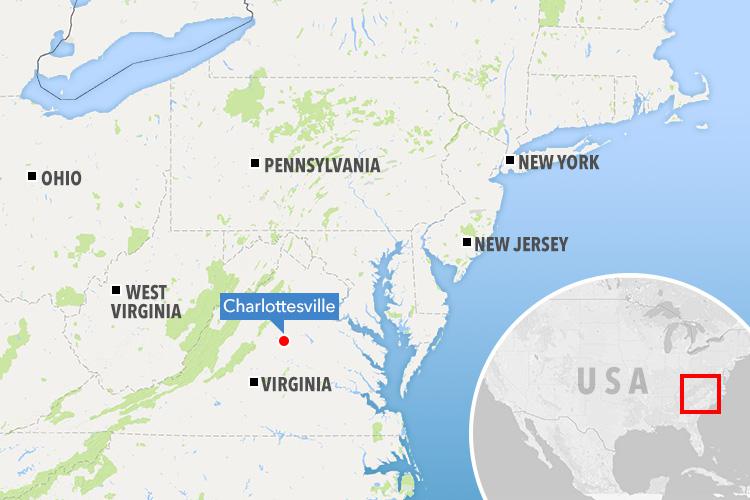Where is Charlottesville, what happened during the riots and what has Donald Trump said?

DONALD Trump is known for his bombastic, blunt and plain-spoken speeches - never hesitating to call out a perceived threat.
So what did the President of the United States say - or not say - in the wake of a tragic counter-protest in Charlottesville, Virginia, that has caused such controversy?
Where is Charlottesville?
Charlottesville is a city of more than 46,000 people, located in Virginia.
White supremacist groups flocked to the city four times in as many months since May 2017 to protest the decision to remove the statue of Confederate General Robert E Lee from one of the city's parks.
The soldier was part of one of the wealthiest slave-holding families in Virginia and went on to fight with the south.
After his death, his image was used as part of the "Lost Cause" narrative - an idea that the South had known it was going to lose the Civil War, between 1861 and 1865, but that it continued to fight on principle.
A statue of Lee was erected in Charlottesville in 1924, with the decision to have it taken down attracting protests from far-right groups.
The city has now caught the world's attention after the counter-rally against the far-right protest turned into tragedy.
What happened during the riots?
Far-right groups had gathered at Charlottesville on August 12 to protest the decision to bring down the statue of Confederate General Robert E Lee.
Among the demonstrations were activist Richard Spencer and former Ku Klux Klan leader David Duke.
The "Unite the Right" rally attracted a peaceful counter-protest in Charlottesville.
But the counter-protest ended in tragedy when a car ploughed into a crowd, killing one person and injuring about 19 others.
Heather Hyer, 32, died after being hit by the car, with her family saying she had been marching in a cry for social justice.
The 20-year-old suspect, James Alex Fields, from Ohio, was arrested on suspicion of second-degree murder, malicious wounding and failing to stop for an accident involving a death. He has been denied bail.
Those part of the far-right rally have begun to be named online, with at least one understood to have been fired from his job.
What did Donald Trump say?
Donald Trump spoke out in the immediate aftermath of the tragedy - but his speech attracted criticism for not being strong enough.
The President of the United States said: "We condemn in the strongest possible terms this egregious display of hatred, bigotry and violence, on many sides. On many sides. It's been going on for a long time in our country.
"Not Donald Trump, not Barack Obama. This has been going on for a long, long time."
He added: "Above all else, we must remember this truth - no matter our colour, creed, religion or political party, we are all Americans first."
He later launched an angry defence of his comments, saying there had been "fine people" protesting the removal of Confederate symbols.
The President claimed left-wing protesters were “violently attacking” white supremacists and insisted the “alt-left” were as much to blame as the far-right.
Why are people angry at Donald Trump?
Republican Ana Navarro said: “This is not ‘many sides’. It’s white supremacist terrorism.
“The President does not have the spine to say so.”
Other Republican leaders like Florida Sen Marco Rubio called out the president for not describing the events in Charlottesville for what they were, “a terror attack by #whitesupremacists”.
New Jersey's governor Chris Christie, a staunch Trump supporter, also spoke out on Twitter, writing: "We reject the racism and violence of white nationalists like the ones acting out in Charlottesville. Everyone in leadership must speak out."
Rep Maxine Waters also spoke out, writing on Twitter: "Trump refuses to condemn white supremacists and terrorists who showed up in Charlottesville. Is he sending a signal? Everyone must be careful."
She then added: "No, Trump. Not many sides, your side."
Former White House communications director, Anthony Scaramucci said the President needs to be “much harsher” on white supremacists.
Mr Scaramucci, 53, said: “I would not have recommended that statement. I think he needed to be much harsher as it related to white supremacists and the nature of it.
“I applaud General McMaster for calling it out for what it is, it’s actually terrorism.”
Donald Trump's response contrasted to that of Virginia's Governor Terry McAuliffe, with the leader telling the right-wing groups: "Go home... You are not wanted in this great commonwealth.
"Shame on you."














